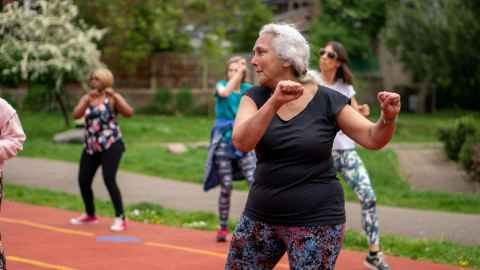Join the movement for osteoarthritis research
3 November 2025
Exercise is the best medicine for osteoarthritis, but what if you don’t know where to start?

A new study by University of Auckland senior lecturer in exercise sciences Dr Rebecca Meiring is looking at whether behavioural motivation to exercise regularly makes a difference for people with osteoarthritis.
“Exercise is one of the first lines of treatment for osteoarthritis and it can make an amazing difference in a couple of weeks but, if people don’t do it, they don’t get the benefits.
“Sometime people go to their GP and are simply told to lose weight or exercise, but it can be daunting to know where to begin.
“We want to know how we can support people, so they know exercise is achievable and can maintain an exercise programme by themselves,” says Meiring, who is supported by the University’s Centre for Co-Created Ageing.
She is looking for 75 people aged over 18 to take part in research.
Half of the participants will have five 30-minute sessions aimed at motivating them to exercise. All participants will have exercises tailored to meet their needs and will receive education about the condition.
Cognitive behavioural techniques will be used to set goals, negotiate obstacles, and develop exercise programmes based on what people enjoy, she says.
The exercise programme is at least one hour a week of strength training to support affected joints.
Osteoarthritis typically causes joint pain, stiffness and swelling and affects about ten percent of the population in New Zealand. It is more prevalent in older people, but can affect younger adults, Meiring says.
About 60 percent of people with the condition are women, and it is particularly prevalent in postmenopausal women.

“From what people in the study tell me, it’s frustrating, the pain and limited movement that people endure. Some people can’t walk downstairs and some struggle to get up from a chair,” she says.
Since the osteoarthritis exercise programme began in 2021, Meiring has seen “amazing” results.
“It’s based on the current capacity of the individual, but they all improve, get stronger, and are able to move more easily,” she says.
To take part in the research, people must be diagnosed with osteoarthritis in their knee or hip, and be able to attend assessments at the University of Auckland before and after an eight-week exercise programme.
Participants receive $100 to cover their travel costs and time.
Meiring is also seeking participants for research on the impacts of exercise on menopause symptoms.
For more information contact: rebecca.meiring@auckland.ac.nz
Media contact
Rose Davis | Research communications adviser
M: 027 568 2715
E: rose.davis@auckland.ac.nz